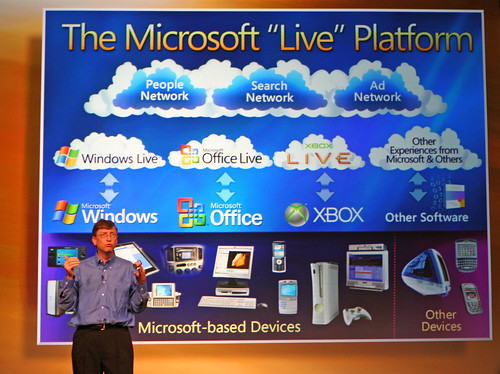| By Russ on Uncategorized  So I actually get Microsoft’s new Live initiative. It makes perfect sense for Microsoft to really go after the online application space as not only are they the standard bearer for many of the desktop apps which online apps emulate, but technically, if I remember correctly, they’re the ones that added in the XML objects to the browser which even makes stuff like AJAX possible. They’re not just following the latest fads and trends here, they’ve been thinking of this stuff since “Hailstorm” years ago. It seems that the difference between then and now is instead of tackling everything in a monolithic platform play which scared the bejeesus out of everyone from partners to privacy advocates, they’re going to go the grassroots route of GMail, Writely and other Web 2.0 style apps instead. Starting small and building services one by one - the Live.com portal is the first example of this. I can imagine subdomains like todo.live.com or calendar.live.com as Microsoft branded PIM apps, then more and more ambitious apps added as they start to flesh out their services. This time they’ll do online apps in a much more realistic piecemeal way, and use their new advertising network to help make it all profitable and worthwhile. (That was the other thing that was missing in 2000 - there was no real viable web app business plan). This is all well and good, and if it stopped there I think many of us might be wondering what all the fuss was about. Ahh, but not so fast. The names that Microsoft chose to launch with show their true intentions and motives. Instead of creating a new “Live” service and concentrating on making that a new profitable business, they instead launched “Windows Live” and “Office Live” as extensions to their desktop monopolies. Live.com isn’t just for new online web apps (as it would appear at first glance) but are meant to be integrated consumer services just like Apple’s iTunes. Ray Ozzie actually gave that as an example today in explaining the power of tying all their different products and services together in one seamless package for consumers. But that’s the key word here of course: Tying. Though it doesn’t seem to make sense for Live to have the Windows or Office names right now - live.com is just another web dashboard at the moment - there are far more ambitious plans to come. The Windows and Office monikers are there because Microsoft will, of course, be up to it’s old tricks by heavily integrating Live services into the desktop sucking the air supply out of any online competitors. It doesn’t seem that they should be allowed to do this sort of thing, but the success of iTunes seems to have given them a new excuse to start tying products again. And hell, the DOJ agreement only lasts until 2007, no? I can easily see MS adding links throughout their OS and Office products as they have with Passport, Hotmail and MSN in an effort to push these new services. And it doesn’t stop there. Microsoft has announced massive Live integration of Messenger buddy lists to make sure that not only are you using their online services, but that all your IM contacts do as well. (They talked of 8 billion “relationships” to take advantage of). As heavy-handed as this seems, it works. Microsoft has a dominating presence in IM outside the US and are well represented domestically as well. How many people do you know have a Passport account simply to make that damn bubble which appears constantly in new XP installs go away? I know many. How do you compete against this onslaught? I’m not sure. Just today we saw a variety of established Web companies already being targeted: Salesforce, Plaxo, Google Search and Maps, AIM, My Yahoo! and more - and that’s just on day one. Imagine what the near future is going to bring? Microsoft most likely has more cash on hand than these companies have in total profits this year combined, so there’s really no discounting this new initiative. If Microsoft executes, it could definitely spell another monopoly in the making. Yep, for Microsoft, Live isn’t about Web 2.0 at all, it’s all about Monopoly 4.0. -Russ |